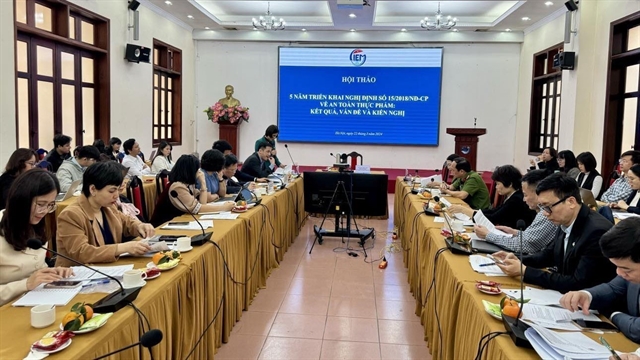 Society
Society


|
| Participants at a workshop "Five years of implementing Decree No. 15/2018/NĐ-CP on food safety: results, issues, and recommendations" in Hà Nội on Friday.—VNA/VNS Photo Thúy Hiền |
HÀ NỘI — Reforms in the State management method for food production facilities, businesses and goods have seen positive results.
Enforcement agencies and the business community highly appreciated the changes brought about by Decree No. 15/2018/NĐ-CP and hoped that it would set a good precedent for reforms in other areas of State management.
Nguyễn Thị Minh Thảo, head of the Business Environment and Competitiveness Research Division under the Central Institute for Economic Management (CIEM), on Friday presented the results of the impact assessment of the decree after five years of implementation at a workshop in Hà Nội.
The workshop "Five years of implementing Decree No. 15/2018/NĐ-CP on food safety: results, issues, and recommendations" was organised by the institute.
It aimed to provide a forum for discussing changes in food safety management methods, achieved results, lessons, shortcomings and proposals.
She further added that prominent changes in the decree such as applying risk management principles based on the level of legal compliance of enterprises and the risk level of goods; adding exempted inspection subjects; comprehensive reform of State management on food safety for imported food; had addressed issues of overlapping management, provided flexibility for businesses in administrative procedures; shifted from pre-inspection to post-inspection.
Additionally, the adjustments and amendments of the decree compared to Decree No. 38/2012/NĐ-CP on food safety were in line with international practices, facilitating the production and business activities of enterprises, reducing pressure on customs authorities, and enhancing the management capacity and quality of State management agencies regarding food safety.
She said that the survey results from the institute showed that businesses had significantly reduced time, costs, and risks and had more opportunities to diversify production and business activities.
Consequently, the number of food-industry businesses had increased rapidly, creating job opportunities and income for millions of workers as well as making significant contributions to GDP and economic growth.
On the side of State management agencies, post-inspection activities had been strengthened and carried out more regularly. Customs authorities had reduced the pressure of customs clearance; cargo release time was faster, meeting international customs commitments.
Speaking at the workshop, Đặng Đức Anh, deputy director of the institute said that Decree No. 15/2018/NĐ-CP was evaluated as a breakthrough institutional reform, reflecting fundamental changes in the State management mindset, shifting from pre-inspection to post-inspection.
The decree had been implemented for five years. That was a legal document with significant impacts on the food-industry business community and changed the State management approach to food safety.
The assessment was crucial for formulating and organising the implementation of policies on food safety management as well as State policies in other specialised fields, he said.
However, Đậu Anh Tuấn, deputy secretary-general and head of the Legal Department under Việt Nam Chamber of Commerce and Industry (VCCI), said that although there were many positive reforms, the decree still had some points that need further research and improvement.
For example, there were unclear regulations in determining the percentage of imported batch inspections in case of applying reduced inspection methods; or inconsistent enforcement for cases where products were trial samples.
In some local authorities, officials were found to still request businesses to submit documents multiple times even though there were requirements beyond regulations. The decree also lacked regulations on registering imported foods containing new additives. — VNS




